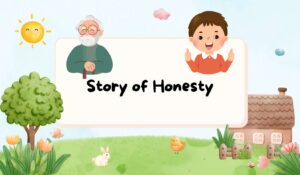Very Short Stories with Moral in English: This collection features exceptionally brief stories, each carrying a meaningful moral lesson. Despite their short length, these tales offer valuable wisdom and insights, resonating with readers of all ages and serving as gentle reminders of timeless values.
The Ant and the Grasshopper:

In a lush meadow, an ant toiled tirelessly, storing food for the upcoming winter. Meanwhile, a carefree grasshopper spent his days singing and dancing, ignoring the ant’s warnings. When winter arrived, the ant had more than enough food, while the grasshopper struggled to find shelter and sustenance.
The moral: Hard work and preparation yield rewards, while laziness leads to hardship.
The Tortoise and the Hare:

In a forest, a boastful hare challenged a slow tortoise to a race. Confident in his speed, the hare dashed ahead, leaving the tortoise far behind. However, the hare grew complacent and took a nap, allowing the tortoise to steadily progress. In the end, the tortoise won the race through steady perseverance, while the hare learned the value of consistency over arrogance.
The Moral: The slow and steady effort leads to success.
The Boy Who Cried Wolf:

A mischievous shepherd boy repeatedly tricked his village by falsely shouting “Wolf!” to see the villagers’ reactions. Eventually, a real wolf appeared, and when the boy cried out for help, no one believed him, leading to disastrous consequences.
The moral: Honesty and credibility are invaluable, and false alarms can have serious repercussions.
The Lion and the Mouse:

A mighty lion spared a tiny mouse’s life, expecting nothing in return. Later, when the lion was ensnared by hunters, the mouse repaid the kindness by gnawing through the ropes, freeing the lion. This taught the lion that even the smallest acts of kindness can be repaid, highlighting the importance of compassion and reciprocity.
The moral: Size doesn’t define kindness. “The Lion and the Mouse” highlights that even small acts of compassion can yield significant returns.
The Fox and the Grapes:

A hungry fox tried in vain to reach a bunch of ripe grapes dangling high above. After several failed attempts, the fox dismissed the grapes as sour and walked away.
The moral: It’s human nature to scorn what we cannot have, but it’s wiser to accept defeat gracefully rather than making excuses.
The Wise Owl:

In a dense forest, animals sought the guidance of a wise old owl. The owl’s wisdom came from years of observing and listening. One day, a young squirrel mocked the owl for being old-fashioned. When a crisis struck, the animals turned to the owl for help.
The moral: Respect for experience and wisdom is essential, as it often holds the key to solving problems.
The Golden Goose:

A poor farmer helped a wounded goose, and in gratitude, the goose laid golden eggs. Over time, the farmer grew impatient and decided to find all the golden eggs at once by cutting the goose open. To his dismay, there were no golden eggs, and he lost the source of his fortune.
The moral: Greed can lead to the loss of valuable assets, and patience is a virtue.
The Magic Paintbrush:

A struggling artist received a magical paintbrush that brought anything he painted to life. However, the artist soon realized the responsibility that came with such power. Instead of using it for personal gain, he painted scenes that brought joy and harmony to the world.
The moral: Power and talent should be used wisely for the greater good.
The Frog and the Scorpion:

A scorpion asked a frog to carry him across a river, promising not to harm the frog. Midway, the scorpion stung the frog. As they both sank, the frog asked why. The scorpion replied, “It’s in my nature.”
The moral: Some behaviors are innate, and one should be cautious about trusting those who are bound by their inherent nature.
The Stone Soup:

In a famine-stricken village, a clever traveler convinced the locals to contribute small amounts of food for a communal soup, claiming to make a magical stone soup. As curiosity grew, everyone added ingredients, turning the stone into a delicious soup that nourished the entire village.
The moral: Cooperation and sharing can create something valuable out of seemingly nothing.
| Click Here | |
| Homepage | Click Here |
FAQs on Very Short Stories With Moral in English
What is an English story?
An English story is a narrative written in the English language, typically involving characters, plot, and setting to convey a message or entertain the reader.
Are there different types of English stories?
Yes, there are various types of English stories, including fairy tales, mystery, science fiction, fantasy, historical fiction, and more. Each type of story offers unique opportunities for storytelling and engaging the reader.
What are some famous English stories or authors?
Famous English stories and authors include works by William Shakespeare, Charles Dickens, Jane Austen, J.K. Rowling, and many others. These authors have made significant contributions to English literature through their storytelling.







